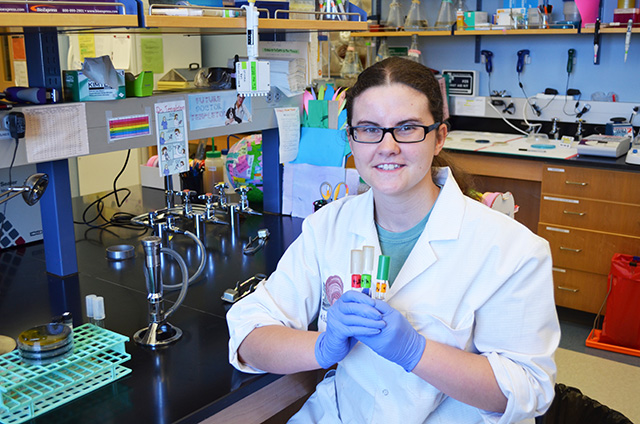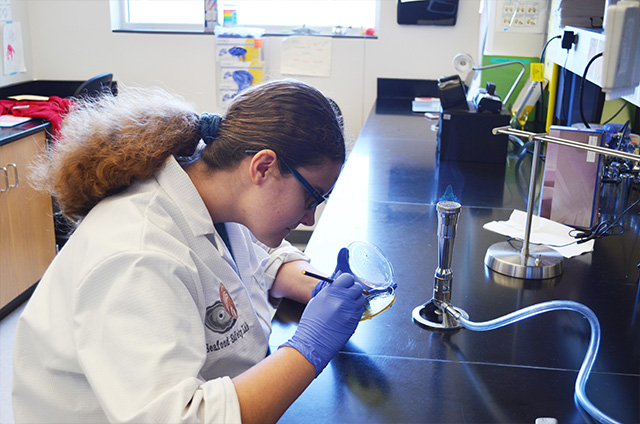Graduate of Texas A&M Galveston studies the effects of road salting on wildlife and human food sources
TweetWhen the warm air from the gulf rises over a cold front from the north, Texans know this often means an ice storm could be coming. When that threat presents itself, cities and counties, especially in the northern areas of the nation, roll out the salt trucks. When the ice melts, the salt washes off the roads and into waterways. Have you ever wondered whether that salt is bad for the fish and other wildlife?

Texas A&M University at Galveston graduate Anna Amason does and she is researching its effects for her PhD. “Trout are freshwater fish and are very important for sport and as a food source,” said Amason. “To maintain their water to salt balance, they actually drink the surrounding water they live in. If the water becomes too high in salt content, the fish can no longer regulate themselves and will eventually die.”
It affects humans by hurting a food resource industry as well as the wild stock for recreational fisherman. “I hope to learn the degree to which the salting is affecting the trout and water bodies around heavily salted roadways,” said Amason.
Amason grew up in the North Oak Cliff section of Dallas with an interest in science. She made her first scientific discovery as a middle school student. “I went on a vacation to Hawaii and found a blue dragon sea slug and contacted the Australian Museum in Sydney,” Amason remembered. “They published the picture I took with an article about the creature’s presence in Hawaii.” This really sparked her interest in marine biology.
While in high school, she worked at Southern Methodist University on some fresh water environmental engineering projects and this led to her first work on a published project. This prompted her to do something career wise for the environment and brought her to Texas A&M Galveston.
“I looked up the top marine biology schools and Texas A&M Galveston suited me best,” said Amason. “I had a microbiology course which opened my eyes to my true love. I worked in the university’s Seafood Safety Lab where I learned proper laboratory techniques and I learned new microbiological processes.”
“Anna was always a very attentive student in the lab course,” said Mona Hochman, senior research associate and lab manager, Texas A&M Galveston Seafood Safety Laboratory. “She is quite adept at applying what she learned in lectures to her laboratory work, and was a natural leader when working with other students. While working in the Seafood Safety Lab, she was equally happy working in the lab or in the field, even during less-than-ideal field conditions. I think this will bode well for her in her graduate studies.”

The Seafood Safety Laboratory works with oyster harvesters along the entire Gulf Coast to ensure a safer product for the consuming public. The U.S. Food and Drug Administration requires harvesters conducting post-harvest processes to have their product regularly tested by an FDA-certified lab to ensure that the process is effectively reducing certain bacteria to non-detectable levels. The Texas A&M Galveston lab has been FDA-certified for this type of testing since the early 1990s.
Amason began working on her Ph.D. at Rensselaer Polytechnic Institute in Troy, New York this fall. Interestingly, Rensselaer is also the alma mater of the Seafood Safety Lab’s director, Dr. John Schwarz. Amason says the focus of her research, would be to do a study on the micro-biome of trout in waters radiating from heavily salted road areas, as well as water samples from at least two different seasons to compare impact. “I hope to acquire control samples from a local fishery in order to have fish that have had no contact with the over salting areas. In addition, I want to take samples radiating out from the salting areas to see how far reaching the salt effect is.”
After Amason receives her PhD, she would like to go into either the pharmaceutical industry or academia to do further research. “Texas A&M Galveston has prepared me for my future career by giving me the skills I need to work efficiently in laboratory settings, present research, write scientific papers and apply my knowledge to research projects. All of these skills are essential in the scientific research field.”
###